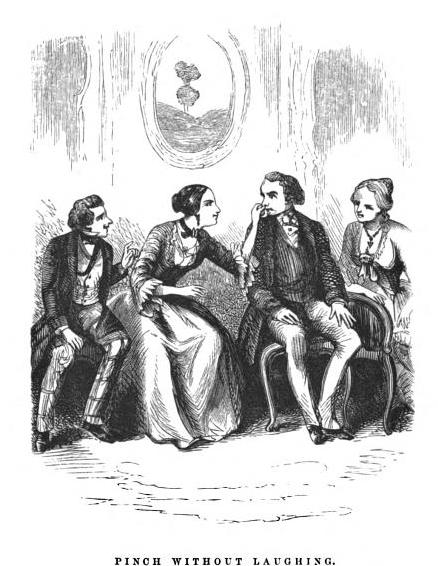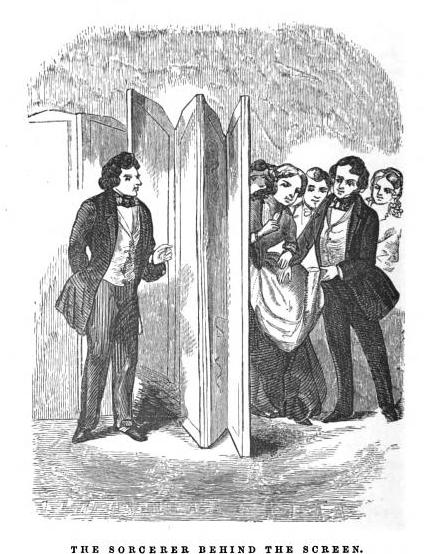It often happens that, by accident of consanguinity or some other connection, people who don't get along must spend a few after-dinner hours together.
Reach far enough back in the annals of history, and you'll discover evenings spent among relations (and non-relations) weren't always so uninspired. Those masters of postprandial entertainment, the Victorians, simply refused to allow their guests to escape unamused. They played cards, contemplated rebuses or exchanged riddles. Before roaring fires, children pantomimed and adults struck poses in elaborate tableaux vivants of subjects mythological and historical. Of special fondness were parlor games, which united brother and sister, stepchild and stepparent, man and wife in diversions both "innocent and healthful," as The Book of Parlor Games puts it.
These amusements existed in such variety as to appeal to every temperament and turn of mind. Logic contests and word-play required keen powers of thought; "games of motion" demanded great vigor and strength. A parlor game could last hours or mere minutes. In terms of set-up, handiness trumped complexity. All but a very few games participants could play using items found in the typical Victorian household. When it was fair, games moved out-of-doors to the garden. Perhaps most importantly, parlor games encouraged virtually no competition, and thus occasioned no potential divisiveness. No one kept score. The winners claimed their friends' applause as their trophy.
Parlor games owed their tremendous popularity, which they enjoyed throughout the nineteenth and early twentieth centuries, to their inoffensive character.
Games requiring greater mental than physical exertion often proved exhilarating in their own right. "A Curate and a Vicar are chosen, and as many professions as there are players," read the instructions to "His Worship and the Curate," as recorded in The Book of Parlour Games :
and when the Curate has begun, and has said to the one he wishes to attack, "I come from your house, Mr. Optician, or Madame the Milliner (or any other trades-person,) but I did not find you in; where were you?" The person interrogated replies, "I was at--(whomever she pleases to say--Hairdresser, Tailor, Goldsmith, &c., provided one has been named.)
The person mentioned, instead of replying, "That is a falsehood," demands of him who has been questioned, "What were you doing there?" and the person must reply something suited to the trade mentioned.... A forfeit must be given when something is said not suited to the trade mentioned. It is the same as if the same motive be assigned for a visit as before. They have a right to the Curate's, and, at his question "What were you doing there?" is replied, "Getting married," or any thing relating to his ministry, and the Curate is obliged to make a reply conformable to the person whose trade he mentions.
In addition to having "nothing rude in it," "His Worship the Curate" enjoyed the virtue of being "useful in giving general notions in arts and trades." If stimulation of the brain led to stimulation to industry, all the better for the individual and society!
Other games emphasized powers of invention over those of perception or recall. In "The Metamorphosis," players chose as their "emblem" a piece of furniture or other such household item. "I should like to be a needle," proclaimed a player. This cued the remaining party to begin applying "delicate or mischievous phrases to the metamorphosed person," in response to the question, "If madame was a needle, what would you do with her, what would you think of her, of what would you wish to be?" A successful answer would have gone something like, "She is English, she is piercing, but that she attaches herself." Conjuring witty and amusing phrases was the object.
Inoffensive amusements, parlor games could only blossom in the vast tracts of time formerly claimed by banal necessity. They belonged, then, to the middle and upper classes, who treated them as means of forging group identity at a time when accomplishing such a thing proved difficult. "When, as in modern societies, families lose the monopoly of the establishment of exchanges which can lead to lasting relationships," writes sociologist Pierre Bourdieu,
If all that's solid melted into air under conditions of capitalism, parlor games and similar practices acted as so many bladders to capture this sublimated social stuff that was formerly so reliably substantial. Capture of this sort required that the individuals participating be taken out of their existing identities and placed in new ones that were determined by the game's instructions, and that in turn determined its outcome. The all-important function of role-playing, then, came down to constituting an identity, however extrinsic and provisional, within a context far simpler and a field of action far more tightly rule-bound than those of the world in which the participants otherwise inhabited. The lack of score-keeping or any other element of competition indicated that the object of a parlor game was not to win the game, but to win allegiances, as the expectation was that the social bonds forged during the game's play the players would translate beyond the confines of that event.
The current after-dinner practice of vegging out in front of the tube appears as simply the next stage of a process set in motion during the great age of the parlor game. The role of television viewer is even simpler than that of pantomimed butcher, baker or candlestick maker; the rules governing the act of viewing simpler still. Keeping quiet and not walking in front of the screen too often is all that is expected of participants. The questions put to them test only the ability to clarify certain plot points: Who is that woman again? Or: Where did he say he left the briefcase? A convenient relief from the subtle agonies of socializing, television viewing is perhaps the most homogenizing parlor game ever devised. Whether you find it in a field or on a couch, a potato is a potato is a potato, after all.


